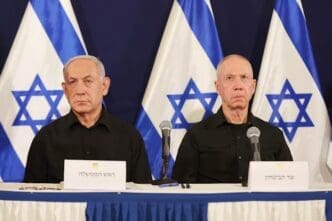In a rare move, the International Criminal Court (ICC) has issued arrest warrants for Israeli Prime Minister Benjamin Netanyahu, former Defense Minister Yoav Gallant, and Hamas leader Mohammed Deif, distinguishing them among global leaders accused of crimes against humanity.
The decision by the ICC marks a significant development in the longstanding conflict between Israel and Hamas. The court’s three-judge panel stated that there were “reasonable grounds” to believe that Netanyahu and Gallant hold responsibility for war crimes and crimes against humanity in the Gaza Strip. This region has witnessed a severe conflict where over 44,000 individuals have reportedly died, and more than 104,000 have been injured in the 13-month war.
Netanyahu has publicly denounced the warrants, describing the ICC’s actions as unfounded and absurd. Meanwhile, Hamas has expressed approval of the warrants against Netanyahu and Gallant, citing years of perceived injustice by what it terms a “fascist occupation.” However, Hamas has notably not addressed the warrant against Mohammed Deif, whom Israel claims was killed in an airstrike—though his death remains unconfirmed by Hamas.
According to the ICC, Deif is implicated in orchestrating attacks on October 7, 2023, that led to the deaths of approximately 1,200 people, mostly civilians, and the abduction of 250 individuals. These acts are characterized as murder, rape, torture, and hostage-taking, falling under both crimes against humanity and war crimes, according to the ICC’s findings.
The warrants against the Israeli leaders allege co-perpetration in war crimes, specifically the starvation of civilians, and crimes against humanity, including murder and persecution. The court highlighted the dire conditions in Gaza, where deprivation of essential resources such as food, water, and medical supplies purportedly led to malnutrition and other fatal outcomes, particularly affecting children.
Furthermore, the determination noted that medical personnel in Gaza were forced to perform surgeries without proper anesthesia due to the blockade on supplies, contributing to great suffering. This aspect, along with evidence of attacks on civilians, solidified the court’s grounds for the warrants.
While these arrest warrants present potential complications for international travel for Netanyahu and Gallant, actual proceedings against them at The Hague seem improbable in the near term. The ICC relies on member states to arrest those it has charged, yet the court has no enforcement capabilities.
These developments echo past episodes wherein the ICC has sought to hold powerful leaders accountable, including warrants for Russian President Vladimir Putin and former Sudanese President Omar al-Bashir. However, geopolitical realities often shield these leaders from actual trial or conviction.
The issuance of warrants against high-profile figures like Netanyahu and Gallant underscores the ICC’s challenging role in international justice, where political dynamics and jurisdictional challenges often impede the court’s efforts.
The ICC’s recent actions against key figures in the Israeli-Hamas conflict highlight the intricate landscape of international justice. As the global community watches, the effectiveness of such warrants remains uncertain, contingent upon both legal precedents and the geopolitical will of nations involved.
Source: News4jax








